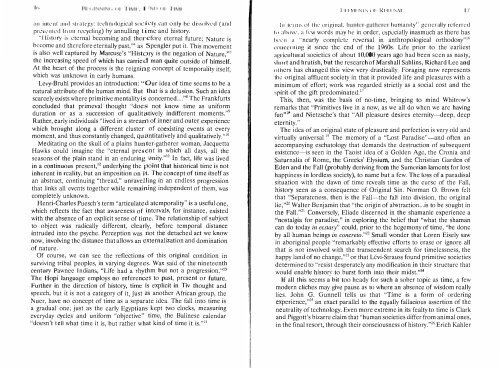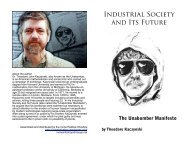CONTENTS - ouroboros ponderosa
CONTENTS - ouroboros ponderosa
CONTENTS - ouroboros ponderosa
You also want an ePaper? Increase the reach of your titles
YUMPU automatically turns print PDFs into web optimized ePapers that Google loves.
II,<br />
;111 illll'lIl alld strategy: technological society call unly be dissolved (and<br />
preVL'lIlcd '''''"11 recycling) hy annulling time and hitory.<br />
"llislOry is eternal becoming and theretore eternal future; Nature i<br />
kcome and thcrefore eternally past,'" as Spengler put it. This movement<br />
is also well captured by Marcuse's "History is the negation of Nature,'"<br />
the incrcasing speed of which has carried man quite outside of himself.<br />
At the heart of the process is the reigning concept of temporality itself,<br />
which was unknown in early humans.<br />
Levy-Bruhl provides an introduction: "Our idea of time seems to be a<br />
natural attribute of the human mind. But that is a delusion. Such an idea<br />
scarcely exists where primitive mentality is concerned .... '" Thc Frankfurts<br />
concluded that primeval thought "doeS not know time as uniform<br />
duration or as a uccession of qualitatively indifferent moments."9<br />
Rather, early individuals "Iivcd in a strearn of inner and outer experience<br />
which brought along a different cluster of coexisting events at every<br />
moment, and thus constantly changed, quantitatively and qualitatively."10<br />
Meditating on the skull of a plains hunter-gatherer woman, Jacquetta<br />
Hawks could imagine thc "eternal present in which all days, all the<br />
seasons of the plain stand in an enduring unity."" In fact, life was lived<br />
in a continuous present," underlying the point that historical time is not<br />
inherent in rcality, but an imposition on it. The concept of time itself as<br />
an abstract, continuing "thread," unravelling in an cndless progression<br />
that links all evcnts together while remaining independcnt of them, was<br />
completely unknown.<br />
Henri-Charles Puesch's term "articulated atemporality" is a useful one,<br />
which rcflects the fact that awareness of interval, tor instance, existed<br />
with the absence of an explicit sense of time. The relationship of subject<br />
to object was radically different, clearly, before temporal distance<br />
intruded into the psyche. Perception was not the detached act we know<br />
now, involving thc distance that allow an externalization and domination<br />
of nature.<br />
Of course, we can see the reflections of this original condition in<br />
surviving tribal peoples, in varying degrees. Wax said of the nineteenth<br />
century Pawnee Jndians, "Life had a rhythm but not a progression."13<br />
The Hopi language employs no referenceS to past, prcsent or future.<br />
Further in the direction of history, time is explicit in Tiv thought and<br />
speech, but it is not a category of it, just as another African group, the<br />
Nuer, have no concept of time as a separate idca. The fall into time is<br />
a gradual one; just as the early Egyptians kept two clocks, measuring<br />
everyday cycles and uniform "objective" time, the Balinese calendar<br />
"doesn't tell what time it is, but rather what kind of time it is.""<br />
111 lei IllS or till· origillal, hllnler- gatlu.:n<br />
111'f\lI'NT L)]' 1,1'111\;\1 I !<br />
. .: r humanityh gt.:ncrally rcfcrrcu<br />
It 1 ahovt.:, a few words may he in order, cspl.:cially inasmuch as there has<br />
h'Ttt a "nearly compiete reversal in anthropological orthodoxy,,16<br />
fOtteeming it since thc cnd of the 1960s. Life prior to the earliest<br />
ariel1ltural societies of about 10,000 years ago had been secn as nasty,<br />
siiort and hrutish, but the research of Marshall Sahlins, Richard Lee and<br />
tIllIers has changed this view very drastically. Foraging now represents<br />
Ille original affluent society in that it provided life and pleasures with a<br />
minimum of effort; work was regarded strictly as a social cost and the<br />
spirit of the gift predominated.17<br />
This, then, was the basis of no-time, bringing to mind Whitrow's<br />
rcmark that "Primitives live in a now, as we all do when we arc having<br />
fun"I' and Nietzsche's that "All pleasure desires eternity-deep, deep<br />
eternity."<br />
The idca of an original state of pleasure and pcrfection is very old and<br />
virtually universal19 The memory of a "Lost Paradise"-and oftcn an<br />
accompanying eschatology that demands the destruction of subsequent<br />
existcnce-is seen in the Taoist idea of a Golden Age, the Cronia and<br />
Saturnalia of Rome, the Greeks' Elysium, and the Christian Garden of<br />
Eden and the Fall (probably deriving from the Sumerian laments for lost<br />
happiness in lord less society), to name but a few. The loss of a paradisal<br />
situation with the dawn of time rcveals time as the curse of the Fall,<br />
history seen as a consequencc of Original Sin. Norman O. Brown fclt<br />
that "Separateness, then is the Fall-the fall into division, the original<br />
lie,"2O Walter Benjamin that "thc origin of ahSlraction .. .is to be sought in<br />
the Fall.'>21 Conversely, Eliade discerned in the shamanic experience a<br />
"nostalgia for paradise," in exploring the bclief that "what the shaman<br />
can do today in ecstasy" could, prior to the hegemony of time, "be done<br />
by all human beings in concreto." " Small wonder that Loren Eisely saw<br />
in aboriginal people "remarkably effeelive efforts to erase or ignore all<br />
that is not involved with the trancendent search for timelessness, the<br />
happy land of no change,"" or that Lcvi-Slraus found primitivc societies<br />
determined to "rcsist desperately any modification in their structure that<br />
would enable history to burst forth into their midst.""<br />
If all this seems a bit too heady for such a sober topic as time, a few<br />
modern cliches may give pause as to where an absence of wisdom rcally<br />
lics. John G. Gunnell tells uS that "Time is a form of ordering<br />
experience,"" an exact parallcl to the equally fallacious sertion of the<br />
neutrality of technology. Even more extreme in its fealty to time is Clark<br />
and Piggott's bizarre claim that "human societies differ from animal ones,<br />
in the final resort, through their consciousness of history."" Erich Kahler






